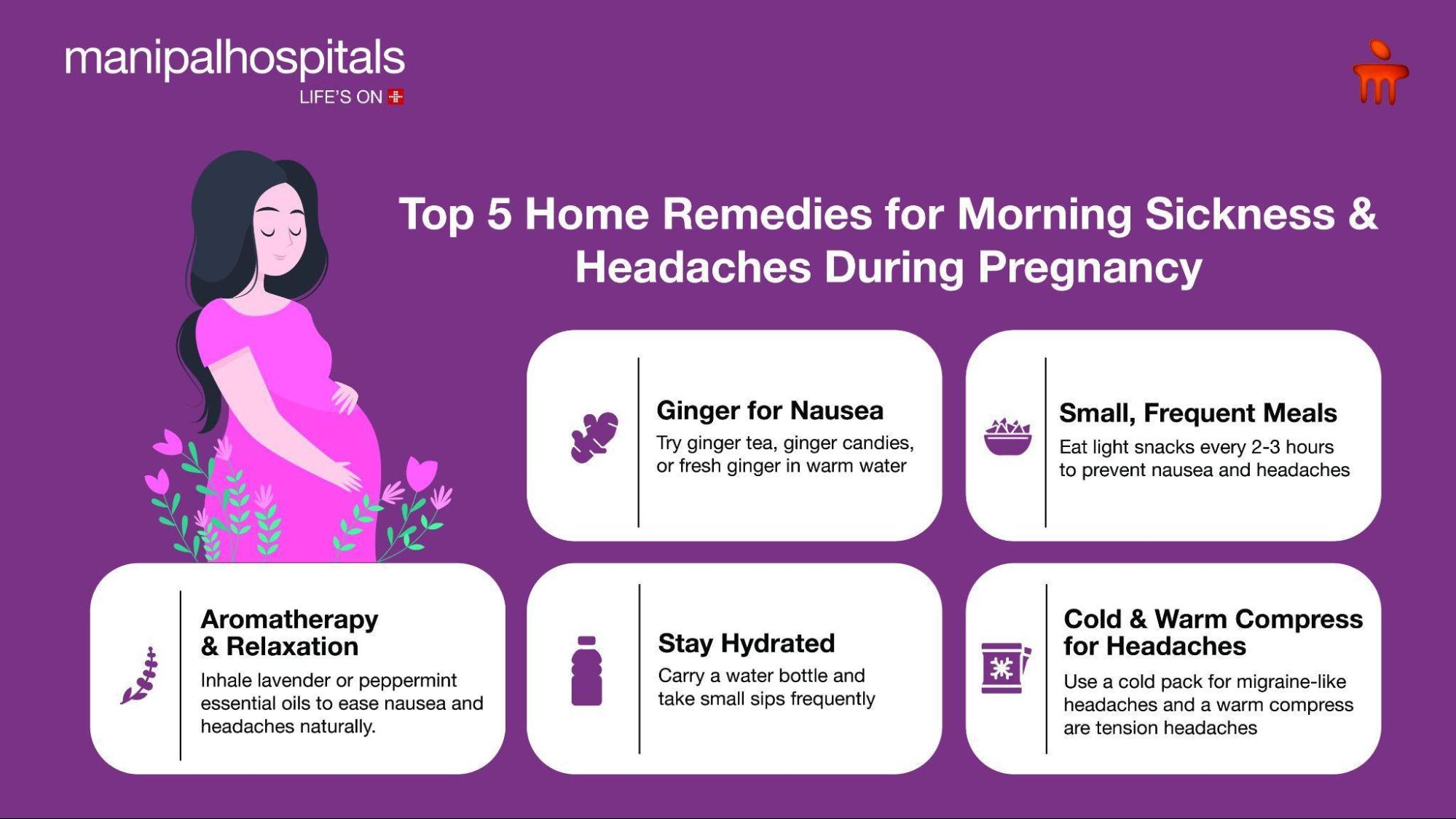
Pregnancy brings many changes to your body, and with those changes come some challenging symptoms, including morning sickness and headache during pregnancy. For many women, nausea and vomiting during pregnancy are common, especially in the first trimester, while strong headaches during pregnancy can often occur due to hormonal changes, dehydration, or stress. As the body adjusts to the growing baby, these discomforts can make day-to-day activities harder than usual.
But worry not—relief is possible. Morning sickness and pregnancy headaches can be eased with proper nutrition, hydration, stress management, and natural remedies like acupressure, acupuncture, or specific supplements. In this blog, we’ll discuss the top tips to help manage morning sickness for pregnant women, reduce headaches during pregnancy, and explore home remedies for nausea and vomiting in pregnancy. If you're wondering about common questions like how to stop vomiting or after how many days vomiting starts in pregnancy, this guide offers expert advice on how to find comfort during these difficult times.
With the right knowledge, you can make your pregnancy journey a bit smoother. If you're seeking immediate guidance or feeling overwhelmed by your symptoms, remember that you can always reach out to a trusted healthcare professional through our instant video consultation service, offering personalized support at your fingertips.
Synopsis
Morning Sickness for Pregnant Women: Causes and When It Peaks
Morning sickness for pregnant women is one of the earliest pregnancy symptoms, typically starting around the 6th week of pregnancy. It often peaks between weeks 9 to 12 and gradually subsides as the second trimester begins. While the term "morning sickness" suggests it only happens in the morning, vomiting during pregnancy can occur at any time of the day. Some women may experience nausea in the afternoon or even at night.
The exact cause of morning sickness for pregnant women isn't fully understood, but it is believed to be linked to hormonal changes, particularly the rise in human chorionic gonadotropin (hCG) and estrogen. Fatigue, stress, and sensitivity to certain smells can also contribute to nausea and vomiting during pregnancy. While most women find relief by the second trimester, some may experience nausea throughout their pregnancy, making effective management essential.
Struggling with morning sickness? If nausea and vomiting during pregnancy are making your days harder, don’t wait for relief—talk to a doctor instantly and get all your queries resolved!
Headaches During Pregnancy: Causes and When It Occurs
Headaches during pregnancy are another common symptom that many expectant mothers experience, especially in the first trimester. These headaches can be triggered by hormonal fluctuations, increased blood volume, dehydration, stress, and lack of sleep. Some women may also experience strong headaches during pregnancy due to low blood sugar levels or sensitivity to light and noise.
While headaches during pregnancy often improve in the second trimester, some women continue to experience discomfort throughout pregnancy. Strong headaches during pregnancy can also be linked to more serious conditions such as preeclampsia, so it's essential to monitor symptoms closely and seek medical advice if they persist or worsen.
Headaches making pregnancy tougher? Whether it's a dull ache or strong headaches during pregnancy, talk to our doctors in 10 minutes for safe relief.
Top 5 Home Remedies to Manage Morning Sickness and Headaches for Pregnant Women
Pregnancy can bring about exciting changes, but it also comes with some common discomforts, including morning sickness for pregnant women and headaches during pregnancy. Many women experience vomiting during pregnancy, particularly in the first trimester, while strong headaches during pregnancy can arise from hormonal shifts, dehydration, or stress. Fortunately, several home remedies for nausea and vomiting in pregnancy can help ease these symptoms naturally.
Here are the top 5 home remedies to help manage morning sickness and headaches during pregnancy:

1. Ginger: A Natural Nausea Reliever
-
Ginger is one of the most well-known remedies for morning sickness and vomiting during pregnancy. It has natural anti-nausea properties that can soothe your stomach and prevent the feeling of nausea.
-
How it helps: Ginger helps in reducing nausea and vomiting, making it an excellent choice for morning sickness for pregnant women.
-
How to use it: You can consume ginger in various forms like ginger tea, ginger ale, or even raw ginger slices. If you prefer something more convenient, keep crystallized ginger nearby for quick relief.
2. Stay Hydrated: Sip Fluids to Prevent Dehydration
-
Dehydration is a common cause of headaches during pregnancy, and it can also exacerbate morning sickness and vomiting during pregnancy. Keeping your body hydrated is essential for managing these symptoms.
-
How it helps: Drinking enough fluids can prevent dehydration-related headaches during pregnancy and ease the nausea associated with morning sickness.
-
How to use it: Drink water throughout the day, and consider adding electrolytes with coconut water or sipping on clear soups. Avoid sugary or caffeinated drinks, as they may worsen dehydration.
3. Peppermint: A Soothing Solution for Nausea and Headaches
-
Peppermint is another herb known for its ability to relieve morning sickness and headaches during pregnancy. It works by relaxing your stomach muscles and helping to ease tension, which can provide relief from strong headaches during pregnancy.
-
How it helps: Peppermint can reduce nausea and provide a cooling effect to relieve headaches.
-
How to use it: Sip peppermint tea, or chew on peppermint leaves. You can also inhale the scent of peppermint oil or use a diffuser to help reduce headache intensity.
4. Eat Smaller, Frequent Meals
-
Many pregnant women experience nausea and vomiting when they go too long between meals. Eating smaller, more frequent meals can help maintain stable blood sugar levels and prevent vomiting during pregnancy.
-
How it helps: Smaller meals prevent the feeling of fullness that can trigger nausea, and they help to manage morning sickness and reduce the chances of strong headaches during pregnancy due to low blood sugar.
-
How to use it: Opt for bland, easy-to-digest foods like crackers, rice, and applesauce. Avoid spicy, fatty, or greasy foods, which can irritate your stomach.
5. Relaxation Techniques to Ease Headaches
-
Headaches during pregnancy can sometimes be caused by stress or physical strain. Relaxation techniques can help ease tension and reduce the frequency and severity of headaches.
-
How it helps: Practicing relaxation can reduce stress and muscle tension, which are common triggers for strong headaches during pregnancy.
-
How to use it: Try deep breathing exercises, prenatal yoga, or gentle stretching. A warm bath with calming scents like lavender can also provide relief. For an added benefit, take a short nap during the day to rest and rejuvenate.
15 Effective Foods to Combat Pregnancy Nausea
| Food | How It Helps | Pro Tip |
| Ginger | Contains natural anti-nausea compounds that help soothe the stomach. | Sip on ginger tea or chew ginger candies. |
| Bananas | Easy to digest and rich in potassium, which helps maintain electrolyte balance. | Eat a banana in the morning to prevent nausea. |
| Crackers & Toast | Helps absorb stomach acid and prevents nausea when eaten on an empty stomach. | Keep crackers by your bedside and eat them before getting up. |
| Lemon | The citrus scent and mild acidity help reduce nausea and vomiting. | Sip lemon water or inhale lemon essential oil. |
| Yoghurt | Contains probiotics that aid digestion and prevent stomach discomfort. | Opt for plain, unsweetened yoghurt to avoid sugar spikes. |
| Apples |
High in fibre, helps regulate digestion and ease nausea. |
Eat apple slices with peanut butter for extra energy. |
| Coconut Water | Keeps you hydrated and replenishes lost electrolytes. | Drink chilled coconut water when feeling nauseous. |
| Oatmeal | Provides slow-releasing energy, preventing low blood sugar-induced nausea. | Add honey or fruits for natural sweetness. |
| Peppermint | Has a calming effect on the stomach and reduces nausea. | Drink peppermint tea or suck on peppermint candies. |
| Rice & Plain Carbs | Bland, easy on the stomach, prevents acidity that triggers nausea. | Stick to plain rice or lightly buttered toast. |
| Chamomile Tea | Soothes digestion and has anti-inflammatory properties. | Sip warm chamomile tea before bedtime. |
| Spinach & Leafy Greens | Rich in iron and folic acid, which can help with pregnancy fatigue and nausea | Add to smoothies if eating raw greens feels difficult. |
| Watermelon | Hydrating and rich in natural sugars to boost energy levels. | Eat fresh watermelon slices or make a smoothie. |
| Boiled Potatoes | A bland, easy-to-digest food that prevents an upset stomach. | Eat with a pinch of salt for added electrolytes. |
| Almonds | High in protein and magnesium, helps reduce nausea symptoms. | Eat a handful of raw almonds as a snack. |
FAQ's
Vomiting usually starts around the 6th week of pregnancy and peaks between weeks 8–12. It typically improves by the second trimester, but some women may experience it longer.
You can try home remedies like ginger tea, small frequent meals, hydration, and acupressure wristbands to manage nausea and vomiting naturally.
Bland foods like crackers, toast, bananas, rice, and ginger-based foods can help ease nausea. Avoid spicy, greasy, and strong-smelling foods.
Yes, despite its name, morning sickness can occur at any time of the day. Hormonal changes, an empty stomach, or fatigue can trigger nausea at night.
If you cannot keep any food or fluids down, or experience weight loss, dehydration, dizziness, or severe vomiting multiple times a day, consult a doctor immediately.
Hormonal changes, dehydration, stress, lack of sleep, caffeine withdrawal, and low blood sugar are common causes of headaches in pregnancy.
Drinking plenty of fluids, getting enough rest, using a cold or warm compress, practising relaxation techniques, and eating small meals can help manage headaches.
Mild headaches are common, but if you have severe headaches, vision changes, or swelling in your hands/face, consult a doctor as it could indicate high blood pressure or preeclampsia.
Mild headaches are common, but if you experience severe or persistent headaches, dizziness, vision problems, swelling, or high blood pressure, it could indicate an underlying issue like preeclampsia. Don’t ignore these warning signs—consult a doctor immediately.





















 9 Min Read
9 Min Read












